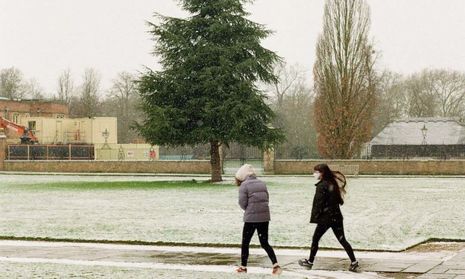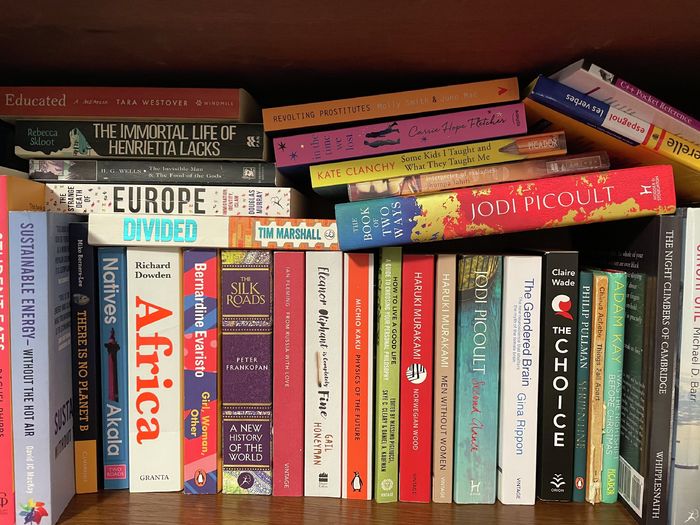Feeling like a fraud: imposter syndrome and me
‘I’ve always felt like I don’t deserve certain things in my life’: Bella Manfredi explores how imposter syndrome transcends the classroom, reflecting on its effects on her first year at Cambridge

If you asked me to pinpoint the moment I first experienced imposter syndrome, I wouldn’t be able to give you a concrete answer. I’ve always felt like I don’t deserve certain things in my life; this feeling came to existence long before I was given my offer from Cambridge.
Imposter syndrome is experienced differently depending on who you are. For me, it’s largely a sense of doubt. Self-deprecation. Finding it hard to believe that my achievements, whether they be academic or social, are valid. I often attribute my successful university application to the support I received from my school; it’s questionable whether this is completely genuine, or another way of downplaying my academic success. As a state school student from the North-West of England, I was frequently reminded by my teachers that I may struggle with these feelings if I did end up in Cambridge. While I was warned of feeling like the odd one out, I don’t think I was quite prepared for the lived experience of it.
“Once again, I felt as if I didn’t deserve my place at university”
My experience on results day further complicates things, as one of my grades was lowered from an A* to a B due to the government’s algorithm, meaning I missed my offer. My school were on the phone within the hour wanting to appeal on my behalf, but thankfully the admissions team emailed me by 10:00 saying that they wanted me regardless.
Out with my friends later that evening, the primary emotion running through my head was one of disappointment. Once again, I felt as if I didn’t deserve my place at university. Like many other students up and down the country, I felt a strange mix of surprise, anxiety, and fear. I didn’t want to be ‘that student’ who missed her offer. Still, I tried to remember, they still wanted me.
On October 2nd I moved into my staircase at Jesus College, known for its friendly atmosphere and higher percentages of state school students. In all honesty, I largely avoided checking admissions statistics whilst I was applying. I did not know that whether or not there would be ‘more people like me’ there.
I distinctly remember meeting my new housemates in our kitchen, talking about politics with them on my first night. “This is Cambridge, right? I can do this,” I told myself. I had expected conversations like this to happen. But what I didn’t expect was the lack of other Northern students — the ‘people like me’. There were eleven people in my household, of which only myself and another student were from the North. While my housemates were lovely, I instantly felt out of place.
“Even socially I felt like an imposter”
By October 6th, when the adrenaline from Freshers’ Week had ran out, I was sat in my room contemplating whether I’d chosen the right university. Would I have been better studying somewhere with more people that understood the slang I was using? Did I miss being able to ramble about football with almost everyone I spoke to at home? Even socially I felt like an imposter within my staircase.
To a degree, I think most people have experienced the sinking of the stomach mid-supervision, or the floor swallowing you whole after you don’t say quite what your supervisor wanted you to say. Imposter syndrome leaves me feeling this way regularly, but it isn’t limited to supervisions. When deciding whether to take the plunge and apply for committee roles in societies, I talk myself into the ground with negativity. I won’t get a role because there are so many people who are better than me. And if I do get a role, it will have been a mistake. I don’t deserve it. This belittling becomes a common feature of doing anything, and it just seems easier to avoid any opportunities. Maybe I don’t want to fight myself all the time. It could be easier to just hold myself back. To not apply for roles. To not pitch articles to Varsity — who’d want to read them anyway?
The existence of the ‘Cambridge bubble’ itself has also been damaging for me at times. As a Fresher, I felt incredibly overwhelmed by the new terminology I was being introduced to. It took me even longer to adapt to how my supervisors spoke, and I often felt myself reeling in supervisions trying to keep up. Naturally, this reinforced my feeling that I would be better off in another university. “Give it some more time,” I’d tell myself, “You deserve to be here. You got an offer.”
Deep down, I know that I do belong here — cliché or not. The satisfaction I get from saying something thoughtful during a supervision is one of my favourite feelings and receiving written or verbal praise counteracts the negativity that I generate myself. Overall, my first year at university has taught me a lot. I don’t have to be the best, and I certainly don’t need to compare myself to other people. I’ve made countless friends and expanded my social circle in ways that I could have only dreamed of prior to arriving. It’s been an enormous challenge during such an unusual ‘COVID year’, but I have come out of the other side fighting.
Has my imposter syndrome magically disappeared since starting university? Not quite. But I’m working on trusting in my own ability, and writing this article is a start.
 News / Deborah Prentice overtaken as highest-paid Russell Group VC2 February 2026
News / Deborah Prentice overtaken as highest-paid Russell Group VC2 February 2026 Fashion / A guide to Cambridge’s second-hand scene2 February 2026
Fashion / A guide to Cambridge’s second-hand scene2 February 2026 News / Downing Bar dodges college takeover31 January 2026
News / Downing Bar dodges college takeover31 January 2026 Comment / College rivalry should not become college snobbery30 January 2026
Comment / College rivalry should not become college snobbery30 January 2026 Lifestyle / Which Cambridge eatery are you?1 February 2026
Lifestyle / Which Cambridge eatery are you?1 February 2026









